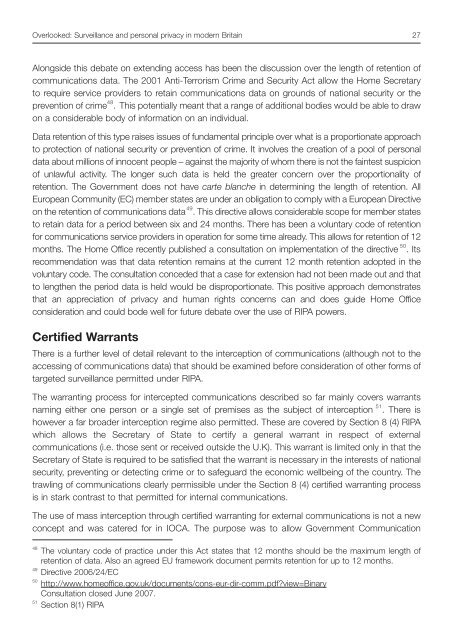Overlooked - Liberty
Overlooked - Liberty
Overlooked - Liberty
You also want an ePaper? Increase the reach of your titles
YUMPU automatically turns print PDFs into web optimized ePapers that Google loves.
<strong>Overlooked</strong>: Surveillance and personal privacy in modern Britain 27<br />
Alongside this debate on extending access has been the discussion over the length of retention of<br />
communications data. The 2001 Anti-Terrorism Crime and Security Act allow the Home Secretary<br />
to require service providers to retain communications data on grounds of national security or the<br />
prevention of crime 48 . This potentially meant that a range of additional bodies would be able to draw<br />
on a considerable body of information on an individual.<br />
Data retention of this type raises issues of fundamental principle over what is a proportionate approach<br />
to protection of national security or prevention of crime. It involves the creation of a pool of personal<br />
data about millions of innocent people – against the majority of whom there is not the faintest suspicion<br />
of unlawful activity. The longer such data is held the greater concern over the proportionality of<br />
retention. The Government does not have carte blanche in determining the length of retention. All<br />
European Community (EC) member states are under an obligation to comply with a European Directive<br />
on the retention of communications data 49 . This directive allows considerable scope for member states<br />
to retain data for a period between six and 24 months. There has been a voluntary code of retention<br />
for communications service providers in operation for some time already. This allows for retention of 12<br />
months. The Home Office recently published a consultation on implementation of the directive 50 . Its<br />
recommendation was that data retention remains at the current 12 month retention adopted in the<br />
voluntary code. The consultation conceded that a case for extension had not been made out and that<br />
to lengthen the period data is held would be disproportionate. This positive approach demonstrates<br />
that an appreciation of privacy and human rights concerns can and does guide Home Office<br />
consideration and could bode well for future debate over the use of RIPA powers.<br />
Certified Warrants<br />
There is a further level of detail relevant to the interception of communications (although not to the<br />
accessing of communications data) that should be examined before consideration of other forms of<br />
targeted surveillance permitted under RIPA.<br />
The warranting process for intercepted communications described so far mainly covers warrants<br />
naming either one person or a single set of premises as the subject of interception 51 . There is<br />
however a far broader interception regime also permitted. These are covered by Section 8 (4) RIPA<br />
which allows the Secretary of State to certify a general warrant in respect of external<br />
communications (i.e. those sent or received outside the U.K). This warrant is limited only in that the<br />
Secretary of State is required to be satisfied that the warrant is necessary in the interests of national<br />
security, preventing or detecting crime or to safeguard the economic wellbeing of the country. The<br />
trawling of communications clearly permissible under the Section 8 (4) certified warranting process<br />
is in stark contrast to that permitted for internal communications.<br />
The use of mass interception through certified warranting for external communications is not a new<br />
concept and was catered for in IOCA. The purpose was to allow Government Communication<br />
48<br />
The voluntary code of practice under this Act states that 12 months should be the maximum length of<br />
retention of data. Also an agreed EU framework document permits retention for up to 12 months.<br />
49<br />
Directive 2006/24/EC<br />
50<br />
http://www.homeoffice.gov.uk/documents/cons-eur-dir-comm.pdfview=Binary<br />
Consultation closed June 2007.<br />
51<br />
Section 8(1) RIPA















